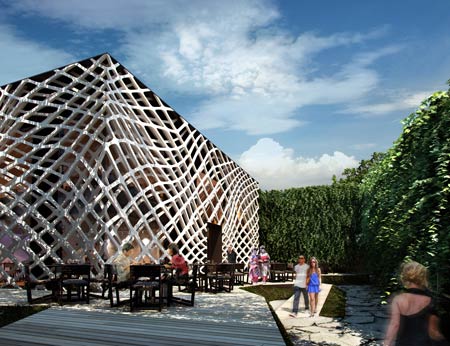Mexican studio Rojkind Arquitectos and industrial designer Hector Esrawe have designed a Japanese restaurant for Mexico City.
Called Tori Tori, the restaurant involves converting a house but aims to make the building unrecognisable.
A two-layer steel lattice will cover the facade of the original house, intended to reference ivy growing on the existing walls behind it.
Esrawe has custom-designed all the furniture for the interior.
The restaurant is due for completion in 2010.
More by Rojkind Arquitectos on Dezeen:
Gimme Shelter for Ordos 100
Nestlé Application Group Querétaro
New Tamayo Museum by Rojkind Arquitectos and BIG
Nestlé Chocolate Museum
Above image © Glessner Group with artist Guido Torres
Exterior images are by Glessner Group unless otherwise stated. Interior images are by ESRAWE Studio.
Here's some more information from Rojkind Arquitectos:
--
Considered one of the best Japanese restaurants in Mexico City and due to its remarkable success, Tori-Tori is now moving to a bigger location in the same area of Polanco, Mexico City, where Architect Michel Rojkind and Industrial Designer Hector Esrawe teamed up to make it happen.
Above image © Glessner Group with artist Guido Torres
At the residential area in Polanco that has seen changes in its zoning, houses have been transformed to office spaces or restaurants.
Sometimes things happen so unnoticeably, that just a small sign appears where a new space has been developed with a completely different program inside, while preserving its exterior.
Aware of this, Rojkind and Esrawe wanted to give enough strength to the new program that they proposed to transform the space inside out.
Taking advantage of the plot’s conditions, the parking space will be left where it is, to use the budget mainly for restructuring and renovating the house, stripping the residential interior and removing all familiar features to produce an entirely different environment.
‘We are being coherent with its culinary know-how and creating the accurate environment and situations for a gastronomical experience. The final result is achieved not only by working with the client but with his complete staff as well.'
Although the client’s requirements were oriented towards a Japanese interpretation, it was not literal, he wanted the place to have its own personal expression, contemporary and cosmopolitan, by enhancing its spatial existing conditions through different experiences, the new range of open spaces, its terraces, its sake bar and its own exclusive temple oriented to the highly demanding sushi lovers.
Maintaining a very intimate and subtle feel towards the first encounter with the exterior, once you enter you’ll find yourself in a terrace, where eating and drinking are embraced by natural vegetation.
The building’s organic façade and landscape were carefully designed to become an extension of the restaurant creating a strong relationship between the inside and the outside.
The interior receives and follows the exterior with subtle contrasts. Each room has its own nature and shows a clear relationship with its function. The furniture was inspired and made for Tori Tori and developed with a direct orientation through each space. During more than eight months a complete collection of chairs and tables where created, for both exterior and interior use.
‘We seek in the project a chance for the users to link with the different ambiances and choose their favorites. Each space’s materials, setup and characteristics towards the furniture generate a wide spectrum of options and sensations for its assiduous clients.’ I.D. Héctor Esrawe, ESRAWE studio
The Façade, which seems to emerge from the ground climbing up through the building, as if mimicking the natural ivy surrounding the retaining walls, is made up of two self-supporting layers of steel plates cut with a CNC machine and handcrafted to exact specifications.
'At rojkind arquitectos we are very rigorous about experimenting with digital design as well as getting things built.
That’s why we have specially focused on how to translate complex geometries into very simple and understandable drawings that benefit from local manufacturing, as is the case of working in Mexico City.
Our vast experience building over the past years has made us aware of the incredible local labor that would be very difficult to get in different countries.
Depending on the geographical location of new commissions given to the office we do enough research to understand in which area we can benefit from local conditions and enhance the final result to make it unique.’ Michel Rojkind, rojkind arquitectos.
The facade’s pattern responds to the inside openings, filtering light, shadows, and views that will constantly invade the interior spaces. An atmosphere enriched by the spectrum of subtle changes.
PROJECT_ TORI TORI RESTAURANT
CITY_ Mexico City
COUNTRY_ Mexico
CONSTRUCTION_ 629 sq.meters
PROGRAM_ Japanese Restaurant
CLIENT_ Dr. Katsumi Kumoto Kawasaki
DESIGN YEAR_ 2008
DATE OF COMPLETION_ 2010
ARCHITECTURAL PROJECT_ rojkind arquitectos [Michel Rojkind] + ESRAWE Studio [Héctor Esrawe]
rojkind arquitectos
PRINCIPAL IN CHARGE_ Michel Rojkind
PROJECT TEAM_ Tere Levy, Agustín Pereyra, Raúl Araiza, Carlos Alberto Ríos, Isaac Smeke Jaber, Enrique F. de la Barrera
ESRAWE Studio
PRINCIPAL IN CHARGE_ Héctor Esrawe
PROJECT TEAM_ Ricardo Casas, Basia Pineda, Ian Castillo, Karianne Rygh, Alejandra Castelao, Jorge Bracho
FACADE CONSULTANTS [3D STUDIES]_ Kokkugia [Roland Snooks, Robert Stuart-Smith]
FACADE ENGINEERING_ GRUPO MAS [Ing. Eduardo Flores]
CONSTRUCTION_ ZDA desarrollo + arquitectura [Yuri Zagorin]
LIGHTING DESIGN_ luz en arquitectura [Arq. Kai Diederichsen]
AUDIO & VIDEO PROJECT_ NTX New Technology Experience
LANDSCAPE DESIGN_ entorno taller de paisaje
STRUCTURAL ENGINEER_ Ing. Juan Felipe Heredia
M.E.P._ QUANTUM Design
FURNITURE_ ESRAWE Studio
KITCHEN_ San-Son
VISUALIZATION_ © Glessner Group [www.glessnergroup.com]
INTERIOR VISUALIZATION_ ESRAWE Studio
INVITED ARTIST_ Photographer Guido Torres

